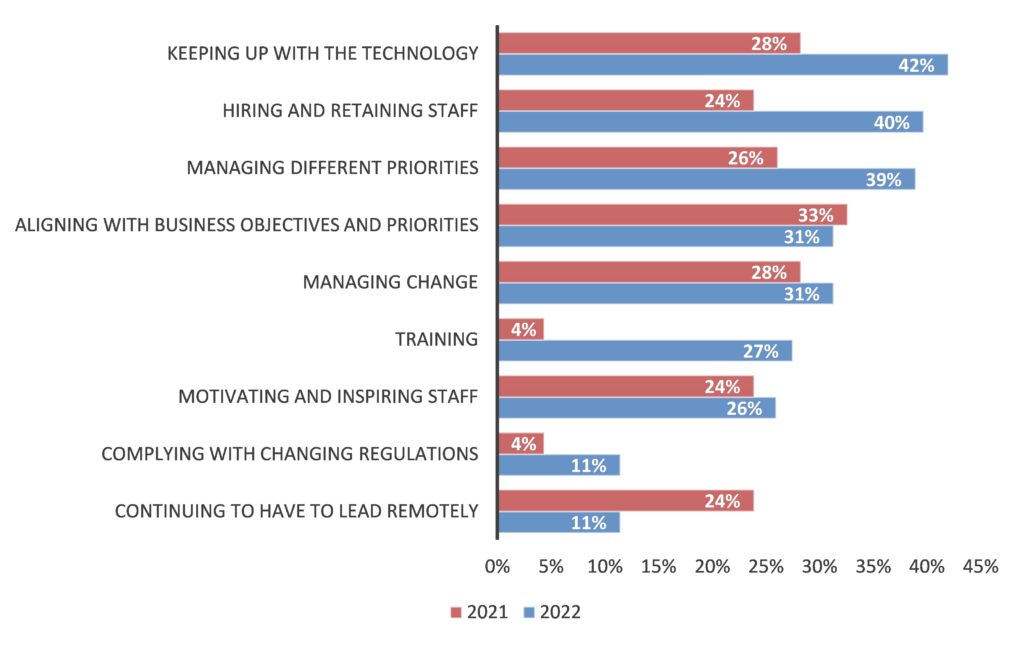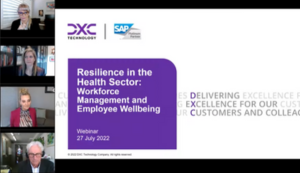Making Skills a Key Component of Your HR Strategy
Meet the Experts
In the face of the Great Resignation, many companies struggled to replace lost skillsets due to employee turnover. Now, as a recession is leading to companies trimming their workforces, employees need to demonstrate skillsets they have, and companies need to identify the skills they need to keep for ongoing projects.
Skills have been more top-of-mind for executives—training was a top challenge for a quarter of technology leaders in our recent research into 2022 CIO agendas. That represented a more than five-times increase over the 2021 data. Likewise, hiring and retention became one of the top challenges that executives are considering this year.
Top Challenges for Tech Executives
Explore related questions

Source: SAPinsider, March 2022
How does insight into skills impact an organization’s HR strategy? They are a connecting force throughout the entire employee lifecycle and carry great importance, according to Jason Cerrato, Senior Direct, Product Marketing at Eightfold.
“Skills create inclusive career experiences with equitable outcomes for all. They help facilitate access and exposure to internal and external opportunities, and they help in driving long-term employee engagement,” said Cerrato on the recent SAPinsider webinar, “Skills Are the Key to Unlocking the Employee Lifecycle.”
Companies are better off if they know the exact skillsets they need for the next big project. Better insight into who has those skills within the organization can help identify the right people for the project and the places where gaps exist. However, organizations may fall short if they simply use an employee’s job description to determine their capabilities.
“As employees, we are more than our role, and we need to pay attention to everything else that happens in the world of work to have a more comprehensive talent profile. That helps the organization understand all the skills that we bring to the table,” explained Cerrato.
He points out that artificial intelligence (AI) capabilities give the potential to go beyond simply what people do at their job. They can incorporate more contextual information that digs deeper into what they can do. That additional information could come from activities like employee resource groups or volunteering.
How Can Companies Become More Skills Focused?
The most important thing a company can do to be more skills-focused is to make data accessible to everyone. This step can give employees ownership of their skills journey, guidance into their career paths, and knowledge of how their skills impact the business. In addition, from an organizational perspective, transparent data makes it easier for managers to make personnel decisions for projects and other work.
Companies also need to show that internal mobility is possible with growth. They need to avoid hoarding talent and support employee journeys. Sure, some employees may leave, but if they leave happy, they will likely remain a champion of the organization. Engaged alumni drive talent back into companies and even drive sales.
Employees also need to be aware of the upskilling opportunities and the work and careers that follow. Companies themselves should tie specific skills to specific business processes. These opportunities must be democratized and available to everyone for a skills-focused culture to succeed.
These steps can help companies embed a skills mindset throughout the employee lifecycle, from recruiting to retirement.
What This Means for SAPinsiders
Focusing on skills simplifies organizational processes. Using a skills-focused strategy can go beyond HR. It also can impact all business processes within an organization. If processes are built with certain skills in mind, and there is more transparency into skillsets available within an organization, then ensuring those processes are adequately staffed becomes simpler.
Skills aren’t just limited to job descriptions. Employees often do much more in an organization than their defined job role. A good strategy will bring in all the possible data. Tools such as AI can help analyze that information.
Give employees control over their skills. Building a great employee experience must include giving employees insight into how the company views their skillset and where that fits with the company’s goals. Employees also need equal access to opportunities, whether upskilling or new job roles.
For more insights, access the on-demand webinar here: “Skills Are the Key to Unlocking the Employee Lifecycle.”










